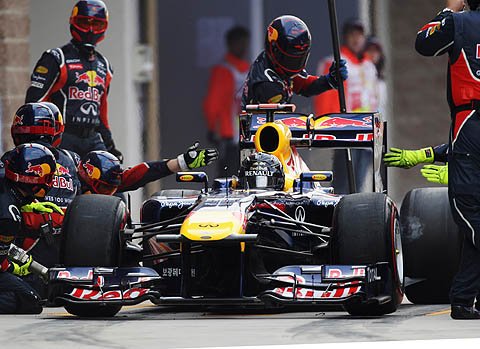


08/11/2011
NEWS STORY
 |
The combination of DRS and Pirelli tyres has made 2011 a bumper year for Formula One, but not just in terms of on-track passing manoeuvres. The characteristics of the Pirelli tyres, designed to improve the racing, have also seen the total number of pit stops rise steeply - so far, there have been an average of 58 stops per race. Slick pit work has always been important in Formula One, but the frequency with which the pit crews have been in action this year has brought both speed and consistency to the fore.
There have been 1013 trips through the pits in the 17 races so far this season. Of these, 25 were accounted for by penalties - 21 drive-through and four stop-go's. This leaves the total number of pit stops in the 2011 season at 988.
The races with the most pit stops were Hungary (85), Turkey (80) and Spain (77). The fewest stops were made in Italy (35), Monaco (41) and Australia (44).
A total of 25 penalties have been served during the races this season: 21 drive-through penalties and four stop-go penalties. The stewards have imposed a total of 49 penalties during the season, including eight reprimands and two exclusions. The offence which has occurred most often is that of 'Causing a collision', which has been penalised 12 times during the races.
Two separate factors can be evaluated when assessing pit stop speed: the 'wheel-stop' time, i.e. the time taken to change all four wheels from the point when the car reaches a standstill in the pits, and the total pit-lane time - i.e. the time between entering and leaving the speed-limited section of the pit lane. Teams measure wheel-stop times using in-house methods - and a stop below three seconds in race conditions is considered extremely competitive. The total pit-lane times are measured centrally, and therefore form the most reliable basis for comparison.
In 17 races, Red Bull has recorded the fastest individual stop on eight occasions. Mercedes has done so seven times (including in three of the last four races), and McLaren and Ferrari once each.
However, in order to build a complete picture of pit stop speed, the average pit stop time is more representative. The team calculates this using a method that discounts repair stops, which require different procedures and are not therefore 'clean' tyre changes. Additionally, stops carried out under the safety car are ignored if pit lane traffic significantly affected performance.
Red Bull set the fastest average time of the weekend nine times (Malaysia, Turkey, Spain, Canada, Europe, Hungary, Belgium, Italy, India). Mercedes did so five times (China, Germany, Singapore, Japan, Korea). McLaren has twice been fastest (Australia and Britain) and Force India once (Monaco). In seventeen races, the fastest single stop and the fastest average stops have been set by the same team nine times. Using the average stop-time calculations, an overall league table can be drawn up, reflecting the consistency in speed of each team.